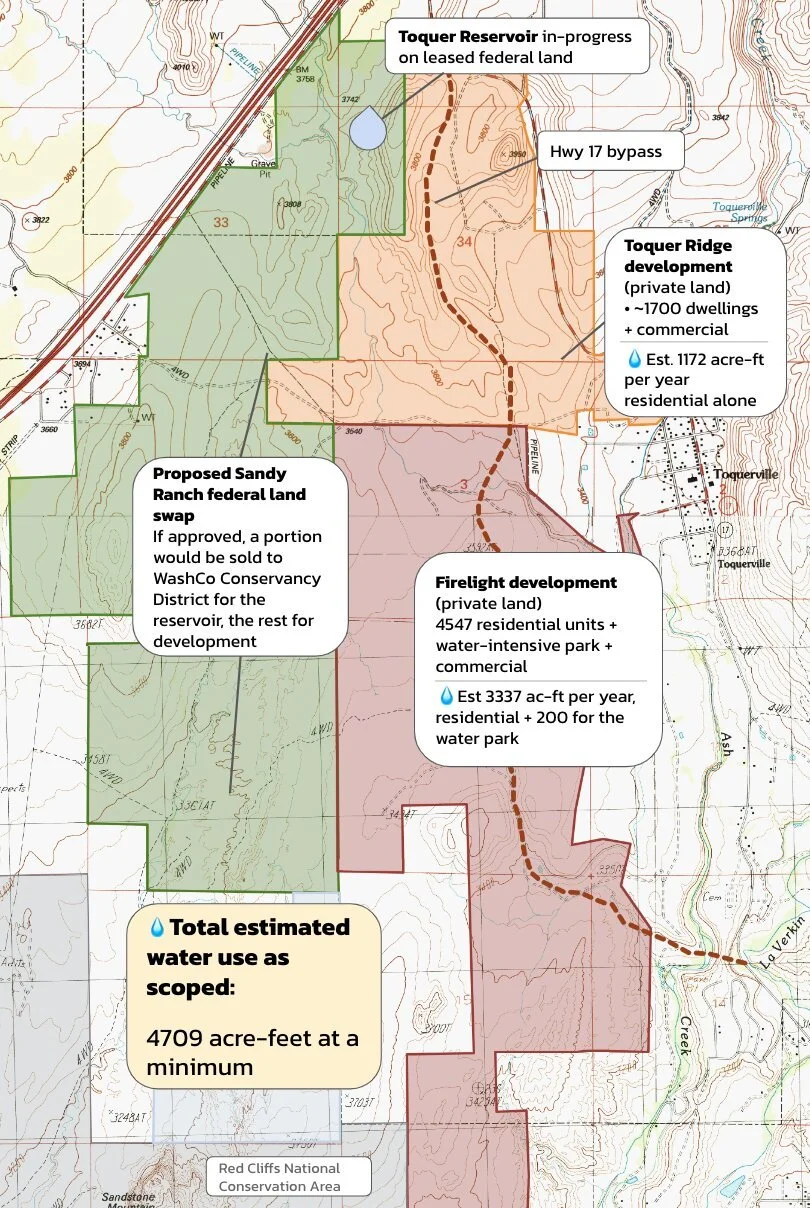Selling off our future for short-term gain
by Michelle Peot
(This is part one in a multi-part series on local water and development. Part two can be read here)
Reliance on Washington County Water Conservancy
Toquerville is one of the cities included in the Washington County Water Conservancy District (WCWCD).
According to WCWCD's 2015 Water Conservation Plan Toquerville holds only 363 acre feet of culinary water rights. This is the second lowest volume for local municipalities behind Ivins.
For context, this is enough for 526 full-time households based on recent usage estimates. The remaining water that Toquerville requires is wholesaled to the city by the water district and those water resources are at risk.
The End of the Lake Powell Pipeline
Toquerville and other WCWCD cities are facing a stark reality.
After more than 15 years and $36 million in wasted taxpayer money on design and planning, WCWCD is finally coming to the realization that they overallocated water resources by clinging to the ill-conceived Lake Powell Pipeline project. While WCWCD continues to call it a future project, the reality is the project is already dead. There isn't enough water in the Colorado River and to move forward means a certain lawsuit from six other states that rely on the river. If it were to be built, local taxpayers would be saddled with an estimated $2.4 billion in additional debt for infrastructure to deliver water from an unreliable source.
What About All of the Recent Precipitation?
Even with the record precipitation this winter and spring, Lake Powell is only expected to rise only around 70 feet to ~30% of capacity. For context, last December, a representative from the Bureau of Reclamation announced that Lake Powell had dropped to less than 160 feet above dead pool which is the point below which water can no longer flow downstream.
How Did We Get Here?
The 1922 Colorado River Compact was crafted on fantastical thinking from the start. The state water allocations were based on a period of anomalously high rainfall. At that time, more realistic volume estimates from USGS hydrologists were ignored to expedite an agreement. In 2019 a contingency plan was authorized to offset a nearly two-decade drought, yet it's still not enough. The Colorado River Management Plan is being actively renegotiated to account for increasing demand and shrinking water volume, but the feds were called in when the deadline passed. California, which holds the most senior water rights, could not come to agreement with the six other compact states.
To compound the problem, local politicians have a hard time saying no to developers over the objections of residents, many of whom have voiced a preference for a more rural lifestyle. Take Toquerville for example. If the two huge Toquer Ridge and Firelight developments are built to master plan capacity, they would consume a minimum of 4700 acre-feet of water combined, not accounting for landscaping (interactive map). The proposed Firelight water park alone would consume enough water for 290 homes. Ivins, which has implemented the strictest water conservation measures in the area, still greenlit a massive new golf resort, Black Desert. The resort lauds itself for not drawing from the municipal water supply, yet it's still tapping into the same aquifer system that we all rely upon.
The Future of Water
That leaves current residents with a bleak future unless a new path is forged. As quoted in a KUER interview: Without the pipeline, “we believe that we can provide enough water to meet the growing demand of our community till somewhere around 2040,” said Brock Belnap, associate general manager of the Washington County Water Conservancy District. “After 2040, our existing supplies within the Virgin River basin will be tapped out as best as we can see.”
Deep Drilling Plan
Rather than addressing the root cause of the problem, unrestrained development, WCWCD is attempting to tap into local deep aquifers without an understanding of the impact on the local aquifers that supply other water users. When UT Geological Survey scientists published a 2013 study stating that the aquifer hydrology was extremely complex and more research was needed to understand the interconnectedness of deep aquifers, WCWCD commissioned their own private study that supported the feasibility of deep drilling. Their plan has drawn protests from local water rights holders who fear that their wells will be impacted.
What Can We Do?
The next post in this series will discuss recent legislative changes around water conservation and more fiscally conservative solutions to our water crisis.

